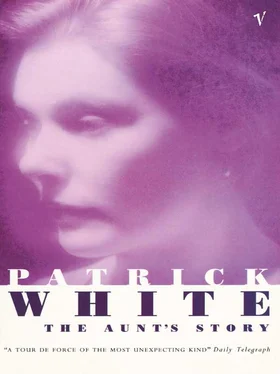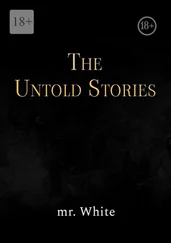Patrick White
The Aunt's Story
THE AUNT’S STORY
Patrick White was born in England in 1912. He was taken to Australia (where his father owned a sheep farm) when he was six months old, but educated in England, at Cheltenham College and King’s College, Cambridge. He settled in London, where he wrote several unpublished novels, then served in the RAF during the war; he returned after the war to Australia.
He became the most considerable figure in modern Australian literature, awarded the Nobel Prize for Literature in 1973. The great poet of Australian landscape, he has turned its vast empty spaces into great mythic landscapes of the soul. His position as man of letters was controversial, provoked by his acerbic, unpredictable public statements and his belief that it is eccentric individuals who offer the only hope of salvation. Technically brilliant, he is one modern novelist to whom the oft-abused epithet ‘visionary’ can safely be applied. He died in September 1990.
All the characters in this story are wholly
imaginary and have no reference whatever
to actual people
She thought of the narrowness of the limits within which a human soul may speak and be understood by its nearest of mental kin, of how soon it reaches that solitary land of the individual experience, in which no fellow footfall is ever heard.
OLIVE SCHREINER
BUT old Mrs Goodman did die at last.
Theodora went into the room where the coffin lay. She moved one hairbrush three inches to the left, and smoothed the antimacassar on a little Empire prie-dieu that her mother had brought from Europe. She did all this with some surprise, as if divorced from her own hands, as if they were related to the objects beneath them only in the way that two flies, blowing and blundering in space, are related to a china and mahogany world. It was all very surprising, the accomplished as opposed to the contemplated fact. It had altered the silence of the house. It had altered the room. This was no longer the bedroom of her mother. It was a waiting room, which housed the shiny box that contained a waxwork.
Theodora had told them to close the box before the arrival of Fanny and Frank, who were not expected till the afternoon. So the box was closed, even at the expense of what Fanny would say. She would talk about Last Glimpses, and cry. She had not lived with Mrs Goodman in her latter years. From her own house she wrote and spoke of Dear Mother, making her an idea, just as people will talk of Democracy or Religion, at a moral distance. But Theodora was the spinster. She had lived with her mother, and helped her into her clothes. She came when the voice called.
At moments she still heard this in the relinquished room. Her own name spilt stiff and hollow out of the dusty horn of an old phonograph, into the breathless house. So that her mouth trembled, and her hand, rigid as protesting wood, on the coffin’s yellow lid.
From the church across the bay a sound of bells groped through a coppery afternoon, snoozed in the smooth leaves of the Moreton Bay fig, and touched the cheek. The blood began to flow. I am free now, said Theodora Goodman. She had said this many times since the moment she had suspected her mother’s silence and realized that old Mrs Goodman had died in her sleep. If she left the prospect of freedom unexplored, it was less from a sense of remorse than from not knowing what to do. It was a state that she had never learned to enjoy. Anything more concrete she would have wrapped in paper and laid in a drawer, knowing at the back of her mind it was hers, it was there, something to possess for life. But now freedom, the antithesis of stuff or glass, possessed Theodora Goodman to the detriment of grief. She could not mourn like Fanny, who would cry for the dead until she had appeased the world and exhausted what she understood to be sorrow. Fanny understood most things. The emotions were either black or white. For Theodora, who was less certain, the white of love was sometimes smudged by hate. So she could not mourn. Her feelings were knotted tight.
Now waiting for Fanny in the yellow afternoon, the thick light prepared a greater state of uncertainty. The chair backs loomed. The back of the little, ordinarily graceful prie-dieu was solid as a tombstone. If gestures were completed, it was according to a law of motion, which takes over from the will, and which now guided Theodora Goodman’s black. Black had yellowed her skin. She was dry, and leathery, and yellow. A woman of fifty, or not yet, whose eyes burned still, under the black hair, which she still frizzed above the forehead in little puffs. You could not have noticed Theodora Goodman. Her expression did not tell. Nor did she love her own face. Her eyes were shy of mirrors. Her eyes fell, except in moments of necessity, frizzing out the little puffs of hair, when she outstared, with a somewhat forced detachment, her own reflection. This thing a spinster, she sometimes mused, considering her set mouth; this thing a spinster which, at best, becomes that institution an aunt.
Viewed this way the situation was more tolerable. There were times when the morning sang with bulbuls encaged in palms, their throats throbbing from behind green slats, and yes, it was very tolerable. She became lighter now, too. Her arrested black flowed through the afternoon. Even a mahogany tombstone dissolved. She was at most, but also at least, an aunt. She swam down the passage, out of her mother’s room, away from the influence of the coffin, and in the suave silence she saw across the bay the pepper trees tossed into green balls by a wind starting, that raked the sea until all the little white boats jumped and fretted and pulled at their moorings to be away.
Oh yes, in other circumstances, this could have been an afternoon on which children came, when they would run and pull at her, their hot laughter, and their chocolate hands, after they had been stuffed with tea. Then it was something to be an aunt, of importance, dashing, almost rakish. Tell us something, Aunt Theo, they cried. Yes, yes, she said; but first I must find my breath. Where; they said; is it under the bunya-bunya tree? Because it was a joke. It was huge. Let us stroke Aunt Theo, said the boys; we shall stroke her moustache.
That was no longer so very terrible when the boys said it. Affection can blunt words, and with affection she responded to their hands. But it was not so much the boys she loved. They were round and hard and fierce as furry animals. It was Lou, whose eyes could read a silence, and whose thin, yellow face was sometimes quick as conscience, and as clear as mirrors. Theodora loved Lou. My niece . It was too intimate, physical, to express. Lou had no obvious connection either with Frank or Fanny. She was like some dark and secret place in one’s own body. And quite suddenly Theodora longed for them to bring the children, but more especially Lou, when they came to town for the funeral. Since her mother’s death, she could not say with conviction: I am I. But the touch of hands restores the lost identity. The children would ratify her freedom.
When the doorbell rang the whole house shook and recovered.
This must be Fanny and Frank, said Theodora, but she waited for them to be brought in and decently arranged in the drawing-room.
She would have waited longer, if the silence had not begun to gape open. So she went down. And it was really down. Certain encounters took her to the depths.
She opened the door and found the uneasy group, Fanny and Frank, not only, yes also, the two boys and Lou. But how, felt Theodora, it is unlike Fanny to consider simple requests, let alone answer unmade prayers.
Читать дальше












